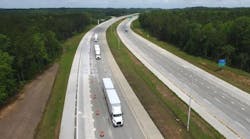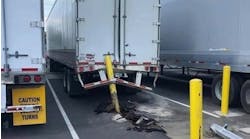A new report found that the promise of automated vehicle technologies such as platooning are not being realized due to outdated state laws.
The Competitive Enterprise Institute (CEI) said these technologies could provide significant cost savings on freight shipments, and increase highway safety.
However, that can only happen “if state lawmakers first change driving laws to allow the new technology,” said Marc Scribner, CEI senior fellow and author of Authorizing Automated Vehicle Platooning: A Guide for State Legislators.
The 2018 edition of the report found that 16 jurisdictions have authorized automated vehicle platooning. That includes nine states during the first half of this year: Alabama, Indiana, Kentucky, Louisiana, Mississippi, Nevada, Oregon, Utah, and Wisconsin.
“Automated platooning technology allows trucks to travel closer together, thereby reducing aerodynamic drag, while still allowing them to move safely at highway speeds,” Scribner said. “With reduced drag, platooning vehicles will reduce fuel consumption, and tailpipe emissions, and enhance highway safety through automatic emergency braking capabilities that will remain effective outside of platoon formations.”
CEI’s full report breaks down these laws by state, and offers suggestions on how to fix existing statutes on following distances that bar platooning.
One state that does not allow platooning is Iowa. Mark Lowe, director of the Iowa Department of Transportation, told the Gazette newspaper the Legislature has twice discussed changing the law but failed due to a lack of understanding of the issue.



